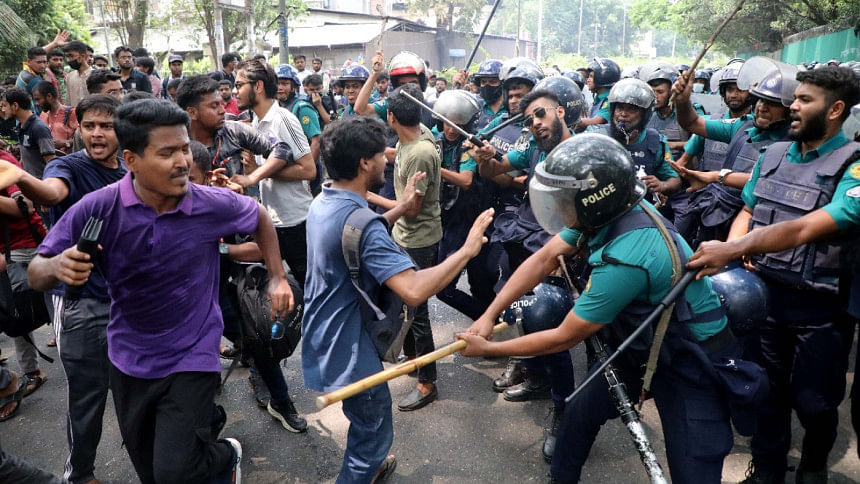JnU crisis exposes the rot in our higher education system

When demonstrators were allowed to stage a protest in front of the Jamuna state guest house—now the official residence of the chief adviser—demanding a ban on Awami League as a party, Section 144 was paused. But it came into effect when another group of protesters attempted to use the same location to press their demands. At least 50 students and teachers of Jagannath University (JnU) were injured by police action when they attempted to reach the venue. Leaders of the National Citizen Party (NCP), who convened the first protest, argued that theirs was a national cause of larger significance, not an institutional one.
If anyone is in doubt, the misty shower sprayed by city corporation water cannons during the heatwave symbolically depicted the blessings that the first protest received. In contrast, the JnU protesters' demands were considered unworthy of disturbing the sanctity of Jamuna. Yet, only months ago, these student bodies acted together to oust an autocratic regime. The preferential treatment of one group over another is adding to a growing resentment that allows us to rewrite the Orwellian maxim: "some students" are "more students" than others.
Fortunately, the University Grants Commission (UGC) chairman announced last evening that the government had accepted the JnU students' demands—hours after the protesters launched a hunger strike to make their collective voice heard.
But this situation demanded intervention much earlier since the proposal to solve the JnU crisis has been with the government for a considerable time. Students are frustrated by the delay in rebuilding a second campus including housing options. The army was given verbal instructions to conduct a feasibility study without any formal work order or budget allocation. The NCP protest's success probably gave the JnU protesters (and other groups) the wrong signal that the only way to solve a crisis is to reach the shore of Jamuna. They discovered the truth the hard way.
An attempt by Mahfuj Alam, the information and broadcasting adviser, to disperse the protesters from in front of Jamuna was met with hostility and derision. The adviser, an exponent of the student-led mass uprising and an ally of the student cause, was struck on the head by a water bottle thrown by a protester. He later blamed a specific political faction for publicly humiliating him. Prof Md Rois Uddin, general secretary of the JnU Teachers' Association, who was present during the parley, later told the press, "You can't even take the hit of a water bottle, yet baton charge our students and break their limbs. If any bullets are fired here, let the first bullet hit me in the chest."
The pronouncement of solidarity by teachers and the lukewarm attempt by the adviser to pacify the protesters, with the rehearsed advice to stay away from provocation, exposed a systemic dysfunction. It revealed a significant trust deficit between marginalised student groups and their national leadership. The spirit of July, informed by an innate desire for an end to all forms of discrimination, gets defeated when members of perceived "elite" institutions or parties are treated with greater leniency. The rift has reinforced class and institutional divides.
Central to the JnU crisis is a list of broken promises. An institution that used to offer degree courses before Dhaka University came into being was upgraded to a university in 2005. The upgrade was superficial, as it did not involve any significant infrastructural investment. The government wanted the university to raise its revenue through tuition fees. Later, it was brought under the same financial arrangement as other state-run universities. The university planned to relocate from its current location in Old Dhaka to a second campus. In 2016, the government allocated 200 acres in Keraniganj and a development budget of Tk 1,734 crore. The project got stalled due to bureaucratic inertia. The Executive Committee of the National Economic Council (ECNEC) found the development project proposal (DPP) faulty and refused to approve it. As a result, over 20,000 students continue to attend classes on a congested campus in Old Dhaka without dormitories or decent facilities.
The protesting students wanted to make sure that their cause would be addressed in the next annual budget. They didn't want any budget cuts, which may deter the army from engaging in construction work. They wanted ECNEC to approve their proposal. And they urged the government to offer a housing stipend for 70 percent of their students until there are proper residential facilities. Following the police action, they further demanded a thorough investigation to ensure punishment of the perpetrators. These demands are far from sudden. Years of neglect have formed the foundation of these demands.
Then again, public sentiment has been quickly shifting. The widespread sympathy that the students garnered started to lose ground fast due to the prolonged roadblocks, traffic paralysis, and media coverage. As commuters remained stuck in gridlock, businesses suffer, and patients are barred from going to hospitals because of the protests, the moral high ground of the protesters is on the verge of ruin.
The dwindling public empathy put the interim government at risk, too. As a by-product of student activism, the government can hardly afford to alienate the next generation. Then there are the ever-nagging conspiracy concerns: is the government using this crisis as a smokescreen to divert attention from other issues? A dirty laundry list has been aired: the Chattogram port's access and management, the UN's proposal for a humanitarian corridor to Rakhine state through Bangladesh, the unresolved Rohingya crisis, and informal "push-in" tactics by India. The list is serious and, quite frankly, puts our national security and regional diplomacy at risk.
Against the backdrop of such a geopolitical drama, the JnU protest offered a more manageable crisis. But if this is a diversion, it is a costly one.
The government has yet to declare any reform commission for education. It seems to be ignoring the sector, which is evident from the number of campus closures, clashes, and the removal of vice-chancellors (VCs). The firefighting mode of the government may sound like an empty excuse. The proxy solutions are far from effective. The government needs to cure the illness affecting our higher education sector. Our universities lack funding for research and development. The abuse of autonomy needs to be checked, and transparency in hiring and accountability across the board are a must-have. There should be an end to politically appointed leadership. Focus should be on updated curricula to prepare students for an international job market.
After receiving assurance from the UGC chairman that all their demands would be met, students and teachers of JnU called off their protest and said all activities of the university would resume today. However, that does not mean the underlying problem is solved. We must use the JnU crisis as a catalyst for reform. For that, dialogue-based conflict resolution mechanisms are needed. The government must listen. The protest around Jamuna was not an isolated disturbance. The noise was produced by a failing system; the slogans shouted were cries for dignity, fairness, and a future worth studying for. Something is rotten in our higher education system. Today, JnU is showing signs of illness. Tomorrow, it could be some other institution pushing beyond tolerance. Let's not wait for the rot to spread. Let's listen before we act.
Dr Shamsad Mortuza is professor of English at Dhaka University.
Views expressed in this article are the author's own.
Follow The Daily Star Opinion on Facebook for the latest opinions, commentaries and analyses by experts and professionals. To contribute your article or letter to The Daily Star Opinion, see our guidelines for submission.

 For all latest news, follow The Daily Star's Google News channel.
For all latest news, follow The Daily Star's Google News channel. 











Comments